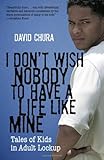There's been some good news in the media lately for anyone who cares about kids and justice. Federal statistics show that the number of juvenile offenders in jail has dropped by at least 25%. Along those same lines, the New York Times recently reported that New York Chief Judge Jonathan Lippman has called for moving most juvenile cases from criminal court to family court, where kids will get more help than punishment, thus adding his voice to the excellent work of the New York Center for Juvenile Justice.
In the Boston Globe, criminologist James Alan Fox wrote that the Massachusetts law that requires all juveniles convicted of first-degree murder to be sentenced to life without parole "has not reduced juvenile murder" -- and he has the numbers to prove it. And, supporting all these concerns, the Annie E. Casey Foundation's No Place for Kids: The Case for Reducing Juvenile Incarceration hits hard at the waste of both taxpayer money and human potential when states lock up young offenders.
Good news, right? So why with all this good news and media attention do I still get cranky about kids in adult jails? Because the 1962 New York State statue setting the age for criminal responsibility at 16 is still law. It is still law even though it was supposed to be a temporary measure until research was conducted (the research was, of course, never done). I'm still cranky because in Massachusetts 59 people are serving life sentences with no chance of ever getting out for crimes committed when they were too young to vote, some of them when they were too young to drive. Because a recent Gallup poll found that two-thirds of Americans think crime is worse than it was last year despite data showing the opposite. Because lawmakers respond more to the electorate's fears than to commonsense and compassion.
But I'll give you an even better reason why I'm cranky. I've seen firsthand what happens to young people caught up in the criminal justice system. Meanwhile, studies are conducted (or not), reports are written, and statistics analyzed; pundits study the issues and experts testify before commissions.
For ten years I taught kids locked up in an adult county jail and watched how the penal system corrupted and eroded their humanity. That's easy to do when you take away people's identity. Give them a number instead of a name; call them "criminal," "inmate," "thug," and you take away their dignity -- and their rights -- the way we do when we label people "illegals." Suddenly it's okay to stop someone and demand their "papers," to deny their families medical care, their children an education and the protections of the law.
The locked-up kids I taught were forced to eat food banned in public schools years earlier. To go without eyeglasses they needed to read, to navigate safely in a perilous environment, eyeglasses they had when they were booked and somehow never got back to them. Worse yet, many of these young people went without the psychotropic medications they had been on for such conditions as depression, bipolar disorder, attention deficit, and psychosis. When those untreated conditions made them hard to handle they were punished, thrown into solitary confinement, where, with no human interaction or mental health treatment, things only deteriorated.
I had students come to class with jaws swollen, and not from some brawl on the block the way you might expect would happen when you lock up together 40 or so teenage boys. The swelling was because of an abscessed tooth, and there was no dentist to take care of it because he only came every other week, or because the sick call form I helped them fill out somehow "got lost."
Other medical treatment, when it was available, was often perfunctory and inadequate. One young man I worked with, Toro, a young Guatemalan who was always respectful to anyone in authority, received 30-day lock-down -- 23 hours alone in a cell with a half hour to clean up and a half hour to do PT -- because he refused to take the unidentified pills the nurse was giving him. "All I wanted to know was what the pills were for," he told me. "I didn't know. I'd never taken them before and nobody would tell me."
None of us, no matter what conditions we're forced to live in, easily gives up our humanity, and the young men and women I saw at the county penitentiary were no different. But their resources -- family, education, community, health, spirituality -- the kind of resources that help all of us hold firm to who we are, were meager even before they were incarcerated. Maintaining even a kernel of humanity in the face of such daily deprivation was near to impossible.
If it all sounds bleak, that's because it is. But I say let the good news roll -- the reports, the endorsements, the calls to action -- but let's do something about the harsh, demeaning, counter-intuitive prison conditions we force young people to live in while insisting that they grow and change. Until then, whether it's the 45,873 16-to 17-year-olds arrested in New York last year or the 57 juveniles serving life without parole in Massachusetts, or just one kid locked up somewhere in the country, I guarantee I'll be cranky, very cranky.
Originally posted on Beacon Broadside

No comments:
Post a Comment